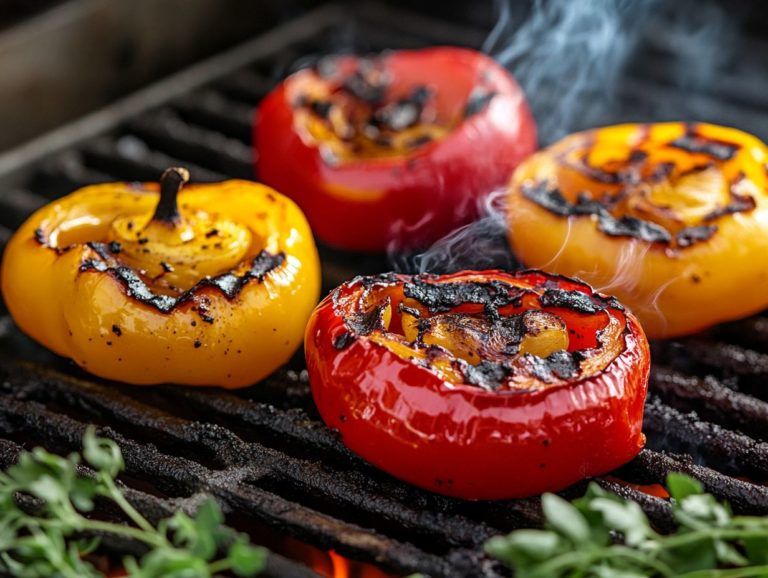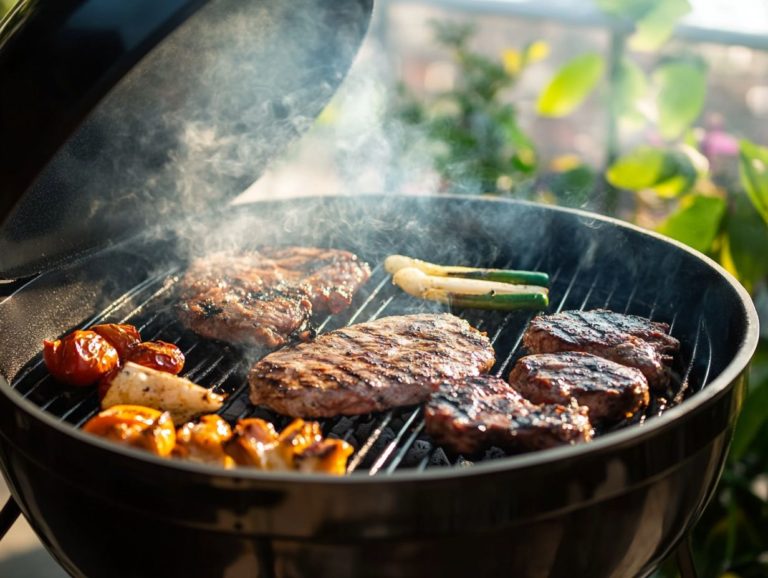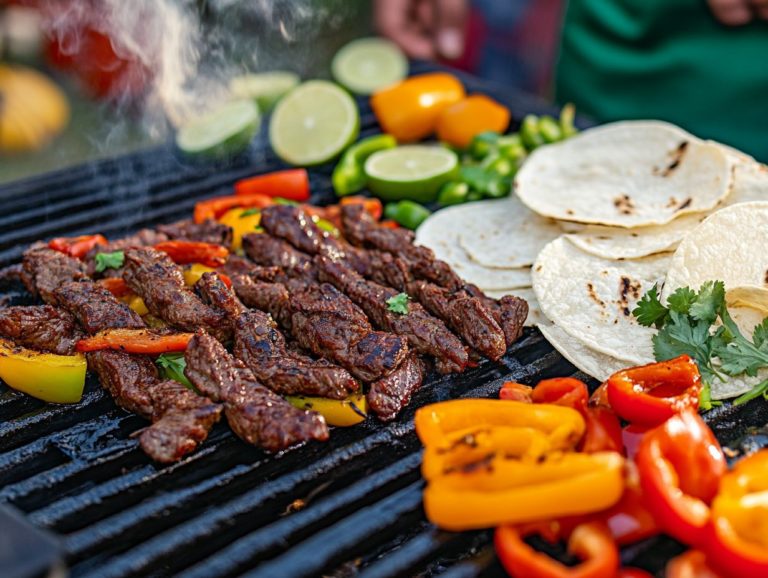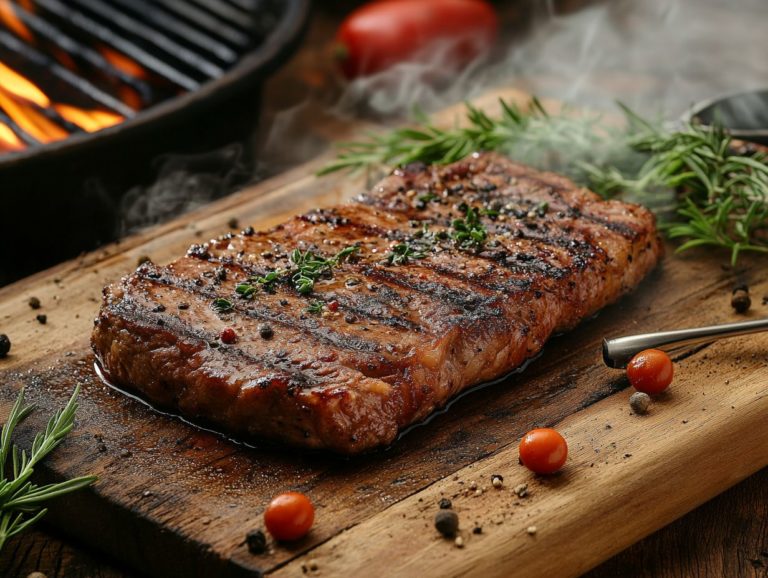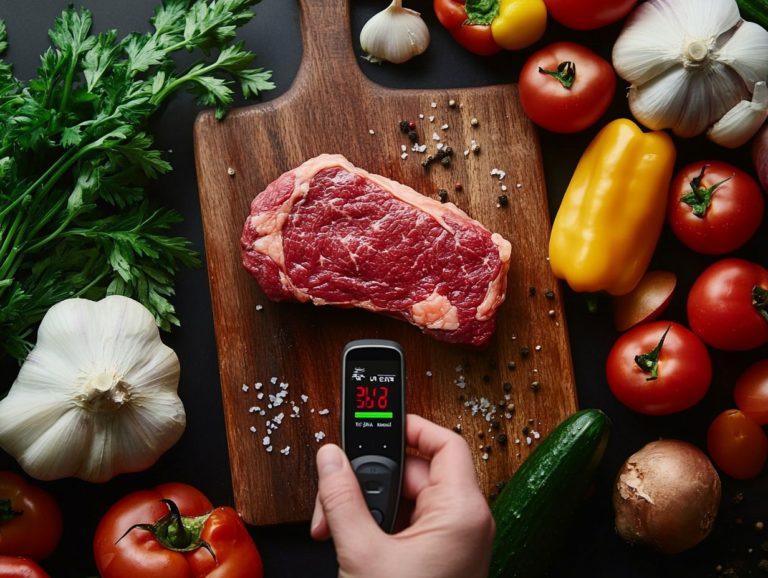How to Properly Oil Your Grill Grates
Grilling is truly an art form, and one of the essential ingredients for a flawless cookout is ensuring your grill grates are properly oiled.
Oiling your grates not only enhances the flavor of your food but also prevents sticking and extends the lifespan of your grill. This article delves into the many benefits of oiling your grill grates, highlights the best types of oil to use, and provides a detailed, step-by-step guide on how to oil them effectively.
You ll also discover vital tips for maintaining your grates and learn about common pitfalls to avoid. Get ready to impress your family and friends with techniques used by chefs like Tyler Florence and Andee Gosnell!
Contents
Key Takeaways:
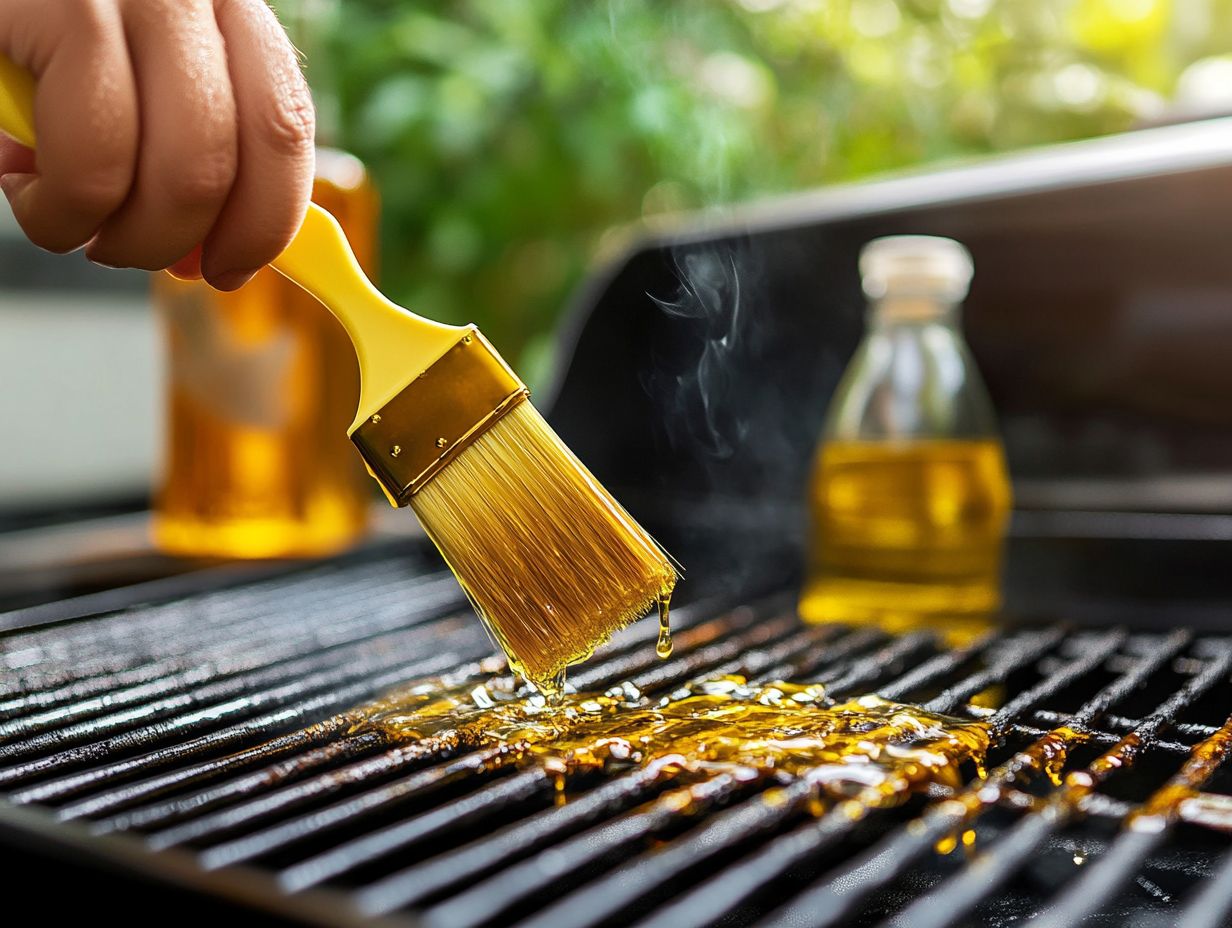
- Oiling your grill grates is crucial for preventing food from sticking and creating flare-ups, especially when using oils that can withstand high heat, like canola or refined avocado oil.
- Use high smoke point oils like canola or vegetable oil for grilling. Avoid low smoke point oils like olive oil.
- Apply a thin layer of oil to the grates using a paper towel or brush before each use. Clean and re-oil after each use for best results.
Why Properly Oiling Your Grill Grates is Important
Properly oiling your grill grates is essential for enhancing your grilling experience. To achieve the best results, it’s also important to understand how to properly preheat your grill. This not only prevents food from sticking but also ensures a delicious outcome when cooking everything from meats to vegetables.
Using the right technique and high smoke point oils can extend your grill’s lifespan, ward off rust, and reduce flare-ups. This will transform your summer barbecues into enjoyable and safe gatherings filled with delicious food.
Follow necessary maintenance procedures to elevate your grilling prowess, enabling you to explore a variety of recipes and flavors that are sure to impress your family and friends.
Benefits of Oiling Your Grill Grates
Oiling your grill grates comes with many benefits, significantly enhancing both the flavor of your food and your overall grilling experience.
By preventing sticking, the oil creates a non-stick surface, allowing for effortless flipping and removal of grilled items, ensuring that nothing is left behind. Choosing a high smoke point oil also protects against burning while infusing subtle, rich flavors that elevate your dishes to new heights.
This straightforward maintenance task also extends the life of your grill by minimizing rust and corrosion, ensuring you enjoy years of reliable use. Ultimately, these advantages make oiling your grates a wise practice for both novice and seasoned grill enthusiasts alike, ensuring a top-notch cooking experience.
Types of Oil to Use
Selecting the right oil for grilling is essential, as each type boasts distinct smoke points and flavor profiles including neutral oils for different recipes that can significantly influence both the cooking process and the ultimate taste of your dishes.
Best Oils for Grilling

The best oils for grilling are those with high smoke points, such as canola, vegetable, and refined avocado oil. These options ensure that your food cooks evenly without the risk of burning.
These oils not only stand up to the intense heat of various grilling methods but also enhance the flavors of your dishes without overwhelming them. When you’re charcoal grilling, where flames can be unpredictable, using refined avocado oil or a cooking spray locks in moisture while perfectly searing your meats.
For gas grilling, canola oil’s light flavor is a perfect complement to the natural taste of seafood or vegetables, making it an excellent choice for skewers, especially when preparing recipes influenced by Bricia Lopez. Meanwhile, when using electric grills, vegetable oil’s versatility shines, especially with marinated chicken breasts or tofu, allowing those seasonings to truly stand out.
By choosing the right oil for your grilling technique, you maximize flavor while achieving that coveted perfect char.
Start oiling your grill grates today and take your grilling to the next level!
How to Oil Your Grill Grates
Get ready to elevate your grilling game! Oiling your grill grates is a simple step that can make all the difference in your outdoor cooking. When done right, it enhances your grilling experience and guarantees delicious results whether you’re grilling succulent chicken breasts or perfectly marinated vegetables that rival those from a master chef like Tyler Florence.
Step-by-Step Instructions
To achieve perfectly oiled grill grates and elevate your grilling game, follow these straightforward instructions for a flawless experience.
Investing time in preparing your grill enhances the flavor of your food and extends the lifespan of the grill itself. Start by preheating your grill to a medium temperature.
Once the grill is heated, remove any debris from previous cooking sessions, as those remnants can compromise both flavor and cooking quality.
Next, grab a clean cloth or paper towel, dip it in oil that can handle high heat, and gently apply a thin layer to the grates. For safety, always use tongs to hold the cloth, keeping your hands safely away from the hot surface.
This method not only prevents sticking but also promotes even heat distribution, ensuring your meals come out perfectly cooked every time.
Tips for Maintaining Properly Oiled Grill Grates
It’s crucial to maintain well-oiled grill grates. This prevents rust and ensures a safe grilling experience for all your culinary endeavors.
Cleaning and Re-Oiling Your Grates
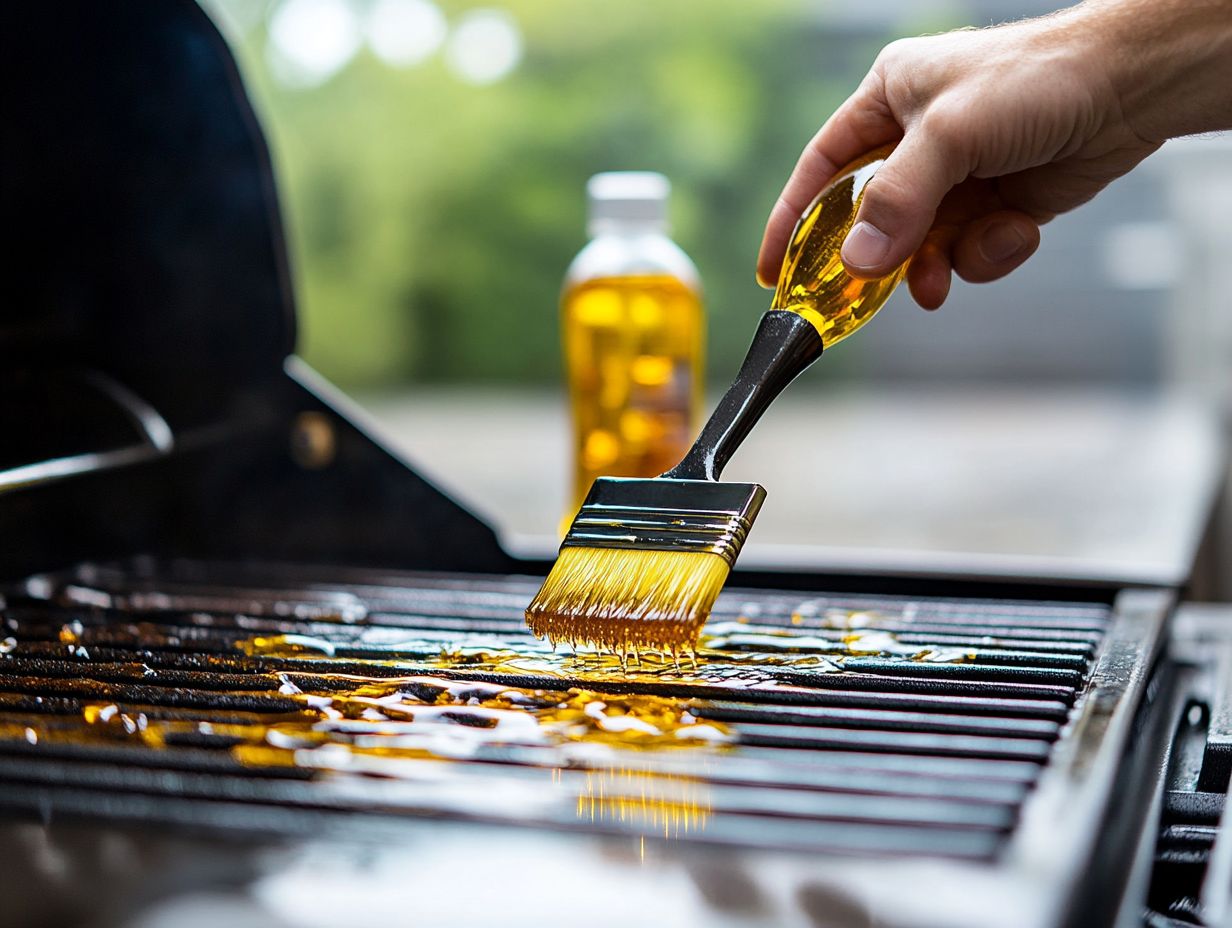
Regularly cleaning and re-oiling your grill grates is essential for maintaining their performance and preventing rust. This keeps your cooking experience enjoyable and safe during summer barbecues.
To achieve optimal results, clean the grates after every use. This helps get rid of food and grease, which can attract bacteria. Simple methods, like scraping with a grill brush or soaking the grates in soapy water, are highly effective. After cleaning, apply suitable grilling oil with a cloth or brush to enhance flavor and create a protective layer against moisture. Depending on how often you grill, consider re-oiling every few sessions to keep things in top shape.
Implementing safety measures, like wearing heat-resistant gloves and ensuring the grill is completely cool before cleaning, will help you avoid burns and accidents. By incorporating these practices, you can reduce the risk of rust while prolonging the life of your grates.
Common Mistakes to Avoid
Avoiding common grilling mistakes like letting your grates become sticky through improper oiling or neglecting to manage flare-ups is crucial for ensuring a truly successful and enjoyable grilling experience.
By paying attention to these details, you can elevate your skills and transform your outdoor cooking into something exceptional.
How to Prevent Sticky Grates and Flare-Ups
Preventing sticky grates and flare-ups is essential for making sure your food retains its flavor while ensuring your grilling experience is both safe and enjoyable.
To achieve this, start by preheating the grill to a suitable temperature before placing any food on the grates. This simple step eliminates bacteria while creating a non-stick surface that makes food release easy when using high smoke point oils.
Proper oiling is another key technique; using oils that can handle high heat, such as canola or grapeseed oil, ensures better adherence to the cooking surface without the risk of burning, contributing to the overall flavor of the meat and vegetables.
Managing your cooking temperature is crucial as well maintaining a consistent heat level can greatly reduce the chances of grease-induced flare-ups.
If you enjoy using marinades, ensure they re balanced to avoid excess sugars that can lead to sticky situations.
By incorporating these methods, including maintaining a consistent temperature and using the right oils, you can truly enhance your grilling experience!
Frequently Asked Questions
Here are some common questions about oiling grill grates:
- How often should I oil my grill grates?
- What type of oil is best for grilling?
- How can I clean my grill grates effectively?
- What should I do if my grates are rusty?
What is the purpose of oiling grill grates?
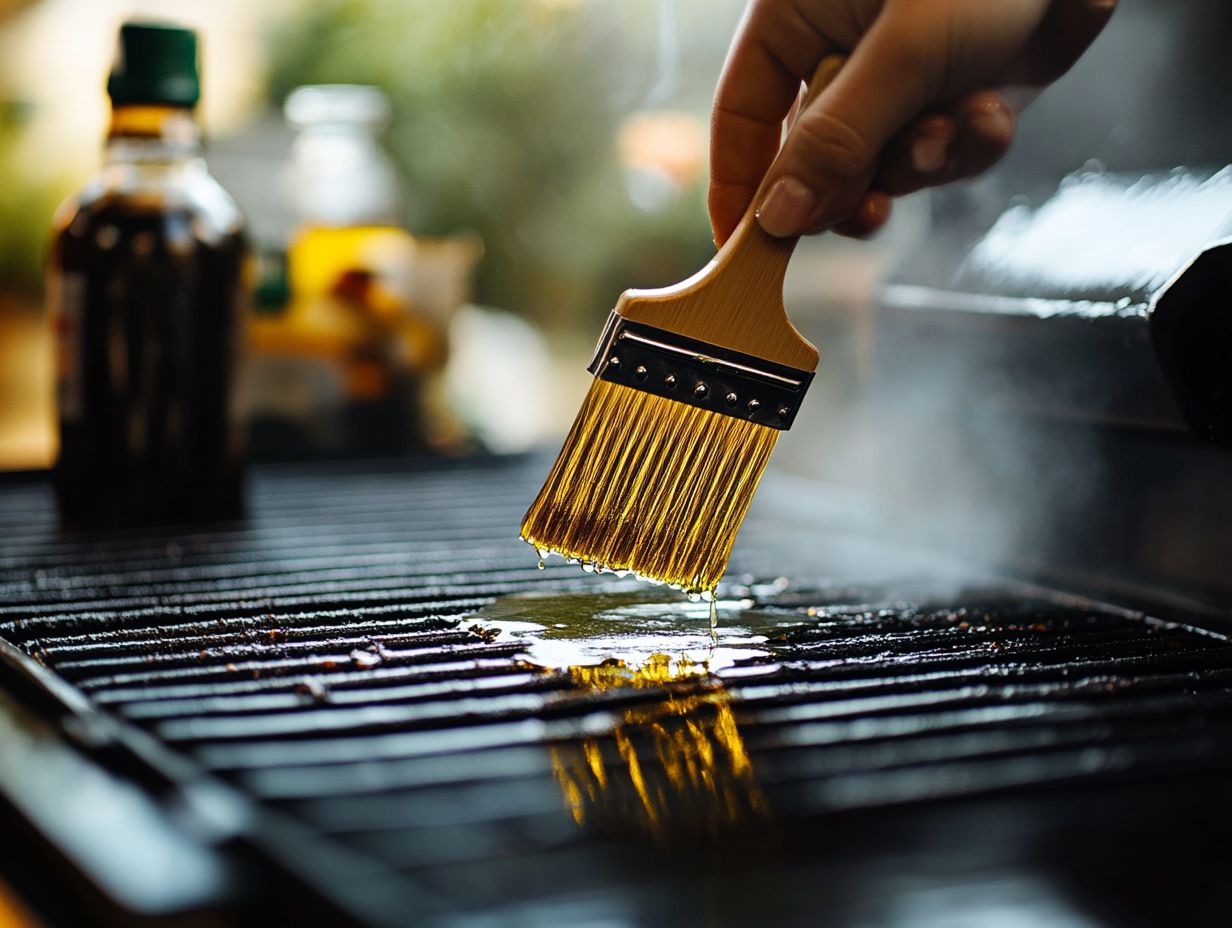
The main purpose of oiling grill grates is to prevent food from sticking. It also helps create beautiful grill marks on your food.
What type of oil should I use to oil my grill grates?
Use oils with a high smoke point. This means they can handle heat without burning. Great options include vegetable, canola, and grapeseed oil.
How should I apply the oil to my grill grates?
There are a few ways to apply oil. Use a brush or a paper towel to coat the grates, or use a spray bottle to evenly distribute the oil.
When should I oil my grill grates?
Oil your grill grates right before cooking for the best results! This creates the perfect non-stick surface that ensures your food shines with grill marks.
Can I use any type of oil to oil my grill grates?
While any oil works, stick with high smoke point oils for the best flavor and safety. Refined avocado oil is a great choice!
Do I need to oil my grill grates every time I use them?
Oiling every time isn’t necessary but recommended for optimal results. If grilling multiple batches, reapply oil between batches to prevent sticking.

